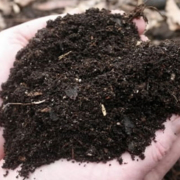Compost and mulch may seem like interchangeable terms for the same thing. But they are two different things with different uses in your landscaping.
Compost is a soil amendment. It is made of organic matter such as food scraps, landscape debris, or livestock manure that have already been partially consumed and mostly decomposed by microorganism. You cannot tell the original source of compost. Good quality compost brings the helpful “OWL” formula of oxygen, water, and life together in one package.
Mulch is a soil topping. Mulch can be either organic or inorganic material that covers soil. The original recycled debris source of mulch is often identifiable. Mulch can be made from organic sources (grass clippings, leaf and yard litter, shredded wood trimmings) or inorganic sources such as gravel or decomposed granite (sometimes called “DG” for short).
The microbes in healthy, biologically diverse mulch will “knit” the organic material together, forming a thick blanket. This mulch cover protects the soil and plant roots from temperature swings, retains moisture by slowing down evaporation from the surface of the soil, and keeps weeds from sprouting by reducing sunlight penetration to the soil surface.
How to Use Compost
You can buy commercially produced compost, or you can make it at home. The compost-making process, or composting, involves creating the optimal conditions for the microbes to do their transformative work.
When compost looks like soil, you can work it directly into the soil. When compost is more coarse or has visible bits of the original materials, the most likely it is used on top of the soil instead of as an incorporated soil amendment worked in.
Compost works in several ways. The compost itself contains particles that improve soil structure. Next, as compost decomposes in soil, it encourages the formation of soil macroaggregates. These macroaggregates are composed of existing soil particles and decomposed organic matter, which combine to create a more stable and better-functioning soil structure.
How to Use Mulch
Mulch always stays on the surface of your soil. It is never worked in. Recycled organic material is the most effective type of mulch, because it builds soil structure over time and provides a durable, protective barrier. The smaller the debris pieces are and the more mixed the organic pieces are such as leaves with wood chips, the faster it decomposes. When building your soil, small mixed mulch is best.
Composted materials, especially coarse composts such as decomposed granite, can also be used as mulch. Artificial and inorganic mulches (DG, gravel, rubber chips) are mainly decorative. They do not contribute to soil life or plant health. They are best used in limited applications, such as creating natural pathways.



